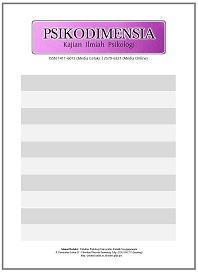Peran Moderasi Resiliensi: Apakah Self-Compassion Memengaruhi Subjective Well-Being Pada Remaja Panti Asuhan?
Abstract
Remaja yang tinggal di panti asuhan menghadapi tantangan besar karena hidup terpisah dari orangtua, yang kerap memicu perasaan kesepian, penolakan, dan rendah diri. Hal ini dapat berdampak pada rendahnya subjective well-being Untuk mengatasi hal tersebut, remaja perlu memiliki self-compassion dan resiliensi agar mampu bangkit dan berdamai dengan pengalaman hidupnya. Penelitian ini bertujuan untuk mengetahui peran moderasi resiliensi dalam hubungan antara self-compassion dengan subjective well-being pada remaja panti asuhan. Penelitian ini menggunakan pendekatan kuantitatif korelasional. Partisipan penelitian adalah 93 remaja yang tinggal di panti asuhan (12-21 tahun). Instrumen pengumpulan data yang digunakan berupa: Satisfaction with Life Scale (α = 0,742); Scale of Possitive and Negative Experience (α = 0,970); Connor- Davidson Resilience Scale (α = 0,86); dan Skala Self-Compassion (α = 0,788). Analisis data menggunakan metode regresi moderasi. Hasil analisis menunjukkan bahwa self-compassion berpengaruh positif signifikan terhadap subjective well-being (β = 0,6747, p < 0,001), demikian pula resiliensi (β = 0,7878, p < 0,001). Namun, interaksi antara self-compassion dan resiliensi tidak signifikan (β = −0,0135, p = 0,244), sehingga resiliensi tidak memoderasi hubungan tersebut. Berdasarkan temuan ini, diharapkan pihak-pihak terkait dapat merancang program intervensi psikologis untuk meningkatkan self-compassion, resiliensi, dan subjective well-being pada remaja panti asuhan guna mendukung kesejahteraan yang optimal.
Keywords
Full Text:
PDF (Bahasa Indonesia)References
Anbar, O. Z. H., Elewa, M. S., & Abdel-Aziz, E. A. (2023). Psychological challenges among Adolescents at Orphanages. Egyptian Journal of Health Care, 14(2), 234–247.
Branje, S., De Moor, E. L., Spitzer, J., & Becht, A. I. (2021). Dynamics of identity development in adolescence: A decade in review. Journal of Research on Adolescence, 31(4), 908–927.
Connor, K. M., & Davidson, J. R. T. (2003). Development of a new resilience scale: The Connor‐Davidson resilience scale (CD‐RISC). Depression and Anxiety, 18(2), 76–82.
Connor, K. M., Davidson, J. R. T., & Lee, L.-C. (2003). Spirituality, resilience, and anger in survivors of violent trauma: A community survey. Journal of Traumatic Stress, 16, 487–494.
Cummins, R. A. (2013). Subjective well-being, homeostatically protected mood and depression: A synthesis. The Exploration of Happiness: Present and Future Perspectives, 77–95.
Derdikman‐Eiron, R., Indredavik, M. S., Bratberg, G. H., Taraldsen, G., Bakken, I. J., & Colton, M. (2011). Gender differences in subjective well‐being, self‐esteem and psychosocial functioning in adolescents with symptoms of anxiety and depression: Findings from the Nord‐Trøndelag health study. Scandinavian Journal of Psychology, 52(3), 261–267.
Diener, E. D., Emmons, R. A., Larsen, R. J., & Griffin, S. (1985). The satisfaction with life scale. Journal of Personality Assessment, 49(1), 71–75.
Dilawar, T., Yousuf, S., & Iliyas, I. (2024). A Descriptive Study on Psychological Well-Being in Relation to Demographic Variables in Adolescent Orphans of Kashmir Valley. Indian Journal of Social Psychiatry, 40(1), 74–77.
Faradilla, A. (2021). Pengaruh kebersyukuran terhadap resiliensi dimediasi oleh optimisme pada remaja panti asuhan. Universitas Muhammadiyah Malang.
Hafiza, S., & Mawarpury, M. (2019). Kesejahteraan Subjektif pada Pemulung: Tinjauan Sosiodemografi. Gadjah Mada Journal of Psychology (GamaJoP), 5(2), 139–150.
Ibda, F., binti Ishak, N. A., & bin Mohd Nasir, M. A. (2021). Kesejahteraan subjektif (subjective well-being) ditinjau dari sosio-demografis di kalangan remaja yatim yang tinggal di panti asuhan/pesantren yatim. Jurnal Al-Ijtimaiyyah, 7(2), 195–212.
Kawitri, A. Z., Listiyandini, R. A., & Rahmatika, R. (2020). Peran self-compassion terhadap dimensi-dimensi Kualitas hidup kesehatan pada remaja panti asuhan. Psympathic: Jurnal Ilmiah Psikologi, 7(1), 1–18.
Lucas, R. E., & Diener, E. (2008). Subjective well-being. Handbook of Emotions, 471484.
Luthar, S. S., Cicchetti, D., & Becker, B. (2000). The construct of resilience: A critical evaluation and guidelines for future work. Child Development, 71(3), 543–562.
Masten, A. S., & Tellegen, A. (2012). Resilience in developmental psychopathology: Contributions of the project competence longitudinal study. Development and Psychopathology, 24(2), 345–361.
Mohammadzadeh, M., Awang, H., Kadir Shahar, H., & Ismail, S. (2018). Emotional health and self-esteem among adolescents in Malaysian orphanages. Community Mental Health Journal, 54, 117–125.
Neff, K. D. (2003a). Self-compassion: An alternative conceptualization of a healthy attitude toward oneself. Self and Identity, 2(2), 85–101.
Neff, K. D. (2003b). The development and validation of a scale to measure self-compassion. Self and Identity, 2(3), 223–250.
Neff, K. D. (2011). Self‐compassion, self‐esteem, and well‐being. Social and Personality Psychology Compass, 5(1), 1–12.
Parra-Rizo, M. A., & Sanchis-Soler, G. (2020). Satisfaction with life, subjective well-being and functional skills in active older adults based on their level of physical activity practice. International Journal of Environmental Research and Public Health, 17(4), 1299.
Sahad, S. M., Mohamad, Z., & Shukri, M. (2018). Differences of mental health among orphan and non-orphan adolescents. International Journal of Academic Research in Psychology, 5(1), 556–565.
Ushanandini, N., & Gabriel, M. (2017). A study on mental health among the adolescent orphan children living in orphanages. J. Humanit. Soc. Sci, 7(17), 484–2225.
Zessin, U., Dickhäuser, O., & Garbade, S. (2015). The relationship between self‐compassion and well‐being: A meta‐analysis. Applied Psychology: Health and Well‐Being, 7(3), 340–364.
DOI: https://doi.org/10.24167/psidim.v23i2.12739
Print ISSN : 1411-6073 | online ISSN : 2579-6321 View My Stats

This work is licensed under a Creative Commons Attribution 4.0 International License.





















